As our parents and loved ones age, there are many challenges. If you hear a diagnosis of dementia, you may wonder what that means for their care – and for their future.
One of the first things you can do is to research dementia is order to understand the condition, and how you can assist your loved one to live their best life.
What Causes Dementia?
It is important to understand that dementia isn’t a single disease. The word is used to describe the symptoms that occur when there is a decline in brain function for any reason. This diagnosis indicates that nerve cells in the brain have ceased performing and will ultimately die, shrinking the brain and adversely affecting cognitive capability.
Causes of Alzheimer’s Disease: The most common type of dementia is the most notorious, Alzheimer’s disease. Two different proteins exist in the brain of someone afflicted with the disease. Amyloids, or plagues, build up around brain cells, while tau deposits result in “tangled” brain cells. Furthermore, neurotransmitters (which send signals between brain cells) require acetylcholine, which shows sharp decline in patients.
Causes of Vascular Dementia: Vascular dementia is caused when blood flow to the brain is restricted. When the blood supply to the brain lessens, nerve cells no longer get the oxygen and nutrients they need, and this will cause them to die. Strokes are often the originating event in vascular dementia, although not all stroke victims will develop the condition.
Causes of Frontotemporal Dementia: Unfortunately, not all dementia occurs in older people. Frontotemporal dementia is often diagnosed between the ages of 45 and 65, and is caused by an abnormal clumping of proteins in the front and side lobes of the brain. Frontotemporal dementia seems to be more genetically driven than other types of dementia.
Most Common Causes of Loss of Brain Function:
Old age
Family history
Damage to blood vessels in the brain
Accumulation of protein in the brain
Huntington’s disease and other genetic disorders
Parkinson’s disease and other neurological disorders
Traumatic brain injuries
Infections which result in a high fever
Metabolic disorders such as thyroid problems and diabetes
Certain medications
Vitamin deficiencies
Poisoning with heavy metals or pesticides
Alcohol abuse
Brain tumor or cancer
How to Proceed After Diagnosis
- Help them to Make Plans: While your loved one is still able, discuss their wishes for medical care, prepare a last will and testament, and settle all personal affairs. Doing so now allows them to participate and make their own decisions.
- Fulfill the Bucket List: No time like the present! If they are physically able, take on all the adventures you always wanted to – from art museums to tropical vacations.
- Keep their Brain Exercised: Play board games, ask questions, or provide them with their favorite crossword puzzle – while you can’t stop the symptoms from progressing, an active brain is fighting harder.
- Take Lots of Photos: For their benefit as they begin to forget, but also for the benefit of those who love them – document this time with photos, videos, even writing down your thoughts about conversations in a journal will help to remember this time.
- Get Educated: Read up as much as you can to understand what your loved one will be experiencing, and keep up to date with treatments, medications and prognoses.
- Find Support: You may want to find a support group of other caregivers and loved ones, in order to build a network of people you can speak with as the disease progresses.
A Banyan Residence is a caring and compassionate place for those living with dementia. We would love the opportunity to discuss your options with you.

